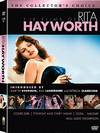





Teresa Wright
Biography | Filmography | Awards | Articles | Remembering | Bibliography | Gallery | News | Downloads | Links | Image Credits | THE LITTLE FOXES | MRS. MINIVER | SHADOW OF A DOUBT | THE PRIDE OF THE YANKEES | THE BEST YEARS OF OUR LIVES
| Interview: |
Excerpt 9 |
Reminiscences of Teresa WrightNew York, June 1959On Elia KazanElizabeth's Note: Elia Kazan directed Teresa Wright in William Inge's "The Dark at the Top of the Stairs" which ran on Broadway from December 1957 through January 1959. There is absolutely no one who can come anywhere near Gadg (Kazan). I felt, in a way, that I'd never been directed before. He's the first person that ever really directed me. By directed, I don't mean he told me what to do. Again, it's a question of bringing out something from you, but he doesn't just sit back and wait for something, the right thing, to come out of you -- as, for instance, Willie Wyler does. He guides or talks or analyzes the character with you so much that you begin to see insights into both yourself and the character that you just weren't aware of. I have never known anyone who had the knowledge of people that he has. I never knew anyone in my life who is as keenly aware, as articulate in talking about it, and he's so spontaneous in his talking. It isn't a set "this is what I've learned about people" sort of thing. He approaches each character, and each situation that that character might have to face, and sort of opens himself up to it completely -- and as he opens himself up to it, he shares with you this tremendous insight and knowledge and compassion that he has for people, and excitement. Q: I'd say this is a new watchword in the theatre today -- this way of approaching acting.I can't help feeling that there are an awful lot of people who tried to copy the outward signs of Gadg's approach -- they sort of go at each part, open it, examine it -- but always you feel it's kind of studied. "This is what I'm going to say about this part," or -- with Gadg you don't feel that. You always feel that he is absolutely experiencing his discovery with you, this knowledge. He really opens himself up, and forces you to open yourself, which is his great gift. It isn't this coldly sitting back and analyzing. I think the key is, it's done with that great really caring. It makes a difference. Creatively, at the moment, experiencing something with you. You never once feel his theatrical knowledge imposed on you. You never once feel that you're doing something for some theatrical effect, and yet certainly he is the most effective theatrically. I heard nothing but praise of Kazan, but not what I saw. I used to sit and listen, as he told things to each character in the play. Each little thing that came up, he'd explore it so, with such enthusiasm. He is the most creative person I have ever met, ever worked with, ever heard about. © 1959 Columbia University and the Oral History Research Office |
|
Return to the Interview Excerpts
Table of Contents. |
| Now in Print! |
|---|
| Now on DVD! |
|---|
Buy Videos & DVDs |
|
Buy Movie Posters |
|
Buy Movie Posters |
|
Classic
Movie Merchandise |
|
![]() Printer-friendly version.
Printer-friendly version.
![]() Return
to the top.
Return
to the top.
Last updated:
March 10, 2011.
Reel Classics is a registered trademark of Reel Classics, L.L.C.
© 1997-2011 Reel Classics, L.L.C. All rights reserved. No
copyright is claimed on non-original or licensed material.
Terms of
Use.









